247 scholarly books by University Press of New England and 7
have author last names that start with D
247 scholarly books by University Press of New England and 7
247 scholarly books by University Press of New England
7 have author last names that start with D have author last names that start with D
7 have author last names that start with D have author last names that start with D
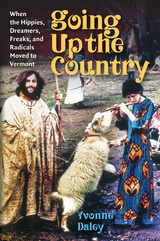
Yvonne Daley
University Press of New England
Going Up the Country is part oral history, part nostalgia-tinged narrative, and part clear-eyed analysis of the multifaceted phenomena collectively referred to as the counterculture movement in Vermont. This is the story of how young migrants, largely from the cities and suburbs of New York and Massachusetts, turned their backs on the establishment of the 1950s and moved to the backwoods of rural Vermont, spawning a revolution in lifestyle, politics, sexuality, and business practices that would have a profound impact on both the state and the nation. The movement brought hippies, back-to-the-landers, political radicals, sexual libertines, and utopians to a previously conservative state and led us to today’s farm to table way of life, environmental consciousness, and progressive politics as championed by Bernie Sanders.
[more]
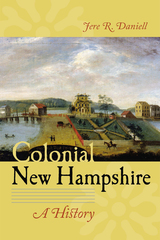
Colonial New Hampshire
A History
Jere R. Daniell
University Press of New England, 2015
In his full-scale history of New Hampshire from the Algonkin people to the coming of the American Revolution, the historian Jere R. Daniell discusses the Indian population, the development of community life, the founding of New Hampshire as a royal colony, the political adjustments that existence as a separate colony necessitated, the nature of New Hampshire’s social institutions, and many other subjects. His epilogue links colonial New Hampshire to subsequent developments in the state. This volume will interest historians of colonial New England and New Hampshire.
[more]

A Documentary History of Communism in Russia
From Lenin to Gorbachev
Robert V. Daniels
University Press of New England, 2001
An extensive revision of the valued but unobtainable 1960 edition. Nearly 300 key documents are now readily available in translation.
[more]

New England Wildlife
Habitat, Natural History, and Distribution
Richard M. DeGraaf
University Press of New England, 2000
New England Wildlife presents the natural histories and distributions of 338 inland wildlife species in New England. It also details the habitat relationships of all New England terrestrial and aquatic species, presented in sections on amphibians and reptiles, birds, and mammals. Each species account includes an illustration and range map, along with information on distribution in the region, status, habitat, special habitat requirements, details of breeding biology, home range and movements, and food habits, each fully documented from the pertinent literature. The introduction includes a brief land-use history of the region, descriptions of forest types and nonforest habitats, and wildlife responses to landscape change. A necessity for all land managers and naturalists as well as birders, walkers, nature lovers, residents, and visitors to New England, the book includes the most recent information on natural history and distribution, and matrices relating all species to standard classifications of forest cover - types and nonforest habitats.
[more]
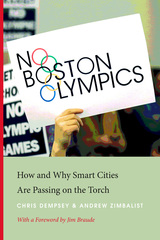
No Boston Olympics
How and Why Smart Cities Are Passing on the Torch
Chris Dempsey
University Press of New England, 2017
In 2013 and 2014, some of Massachusetts’ wealthiest and most powerful individuals hatched an audacious plan to bring the 2024 Summer Olympics to Boston. Like their counterparts in cities around the world, Boston’s Olympic boosters promised political leaders, taxpayers, and the media that the Games would deliver incalculable benefits and require little financial support from the public. Yet these advocates refused to share the details of their bid and only grudgingly admitted, when pressed, that their plan called for billions of dollars in construction of unneeded venues. To win the bid, the public would have to guarantee taxpayer funds to cover cost overruns, which have plagued all modern Olympic Games. The United States Olympic Committee (USOC) chose Boston 2024’s bid over that of other American cities in January 2015—and for a time it seemed inevitable that the International Olympic Committee (IOC) would award the Games to Boston 2024. No Boston Olympics is the story of how an ad hoc, underfunded group of diverse and engaged citizens joined together to challenge and ultimately derail Boston’s boosters, the USOC, and the IOC. Chris Dempsey was cochair of No Boston Olympics, the group that first voiced skepticism, demanded accountability, and catalyzed dissent. Andrew Zimbalist is a world expert on the economics of sports, and the leading researcher on the hidden costs of hosting mega-events such as the Olympics and the World Cup. Together, they tell Boston’s story, while providing a blueprint for citizens who seek to challenge costly, wasteful, disruptive, and risky Olympic bids in their own cities.
[more]
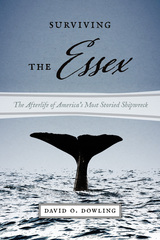
Surviving the Essex
The Afterlife of America's Most Storied Shipwreck
David O. Dowling
University Press of New England, 2016
Surviving the “Essex” tells the captivating story of a ship’s crew battered by whale attack, broken by four months at sea, and forced—out of necessity—to make meals of their fellow survivors. Exploring the Rashomon-like Essex accounts that complicate and even contradict first mate Owen Chase’s narrative, David O. Dowling examines the vital role of viewpoint in shaping how an event is remembered and delves into the ordeal’s submerged history—the survivors’ lives, ambitions, and motives, their pivotal actions during the desperate moments of the wreck itself, and their will to reconcile those actions in the short- and long-term aftermath of this storied event. Mother of all whale tales, Surviving the “Essex” acts as a sequel to Nathaniel Philbrick’s In the Heart of the Sea, while probing deeper into the nature of trauma and survival accounts, an extreme form of notoriety, and the impact that the story had on Herman Melville and the writing of Moby-Dick.
[more]
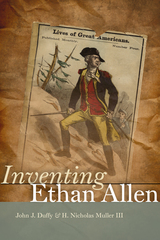
Inventing Ethan Allen
John J. Duffy
University Press of New England, 2014
Since 1969, Ethan Allen has been the subject of three biographical studies, all of which indulge in sustaining and revitalizing the image of Allen as a physically imposing Vermont yeoman, a defender of the rights of Americans, an eloquent military hero, and a master of many guises, from rough frontiersman to gentleman philosopher. Seeking the authentic Ethan Allen, the authors of this volume ask: How did that Ethan Allen secure his place in popular culture? As they observe, this spectacular persona leaves little room for a more accurate assessment of Allen as a self-interested land speculator, rebellious mob leader, inexperienced militia officer, and truth-challenged man who would steer Vermont into the British Empire. Drawing extensively from the correspondence in Ethan Allen and his Kin and a wide range of historical, political, and cultural sources, Duffy and Muller analyze the factors that led to Ethan Allen’s two-hundred-year-old status as the most famous figure in Vermont’s past. Placing facts against myths, the authors reveal how Allen acquired and retained his iconic image, how the much-repeated legends composed after his death coincide with his life, why recollections of him are synonymous with the story of Vermont, and why some Vermonters still assign to Allen their own cherished and idealized values.
[more]
READERS
Browse our collection.
PUBLISHERS
See BiblioVault's publisher services.
STUDENT SERVICES
Files for college accessibility offices.
UChicago Accessibility Resources
home | accessibility | search | about | contact us
BiblioVault ® 2001 - 2024
The University of Chicago Press









